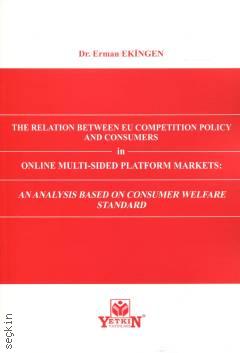>
Hukuk Kitapları>
Tüketici Hukuku>
The Relation Between EU Competition Policy and Consumers in Online Multi–Sided Platform Market: An Analysis Based on Consumer Welfare Standard

The Relation Between EU Competition Policy and Consumers in Online Multi–Sided Platform Market: An Analysis Based on Consumer Welfare Standard
1. Baskı,
Mayıs 2022
Kitabın Detayları
Dili:
Türkçe
Ebat:
16x24
Sayfa Sayısı:
248
Kitabın Fiyatı:
250,00₺
Temin süresi 2-3 gündür.
Kitabın Açıklaması
The relation-ships betvveen actors in online MSP markets are not as basic and sepa-rated as in traditional single-sided markets. For that reason, the behav-iour of the online MSPs to consumers and the results of their specifıc practices can create anticompetitive results such as unfair pricing, lower quality, less variety of products and slovver innovation in these markets.
Therefore, this research aims to analyse how these emerging dynamics in online MSP markets affect consumers' positions and conditions by reviewing the consumer vvelfare standard in different existing practices of these platforms.
After the consumer vvelfare oriented competition analysis of geo-blocking, tying and bundling, and most-favoured-nation (MFN) practices of online MSPs, the discussion vvill conclude that it is necessary to secure greater competition among online MSPs, provide the right conditions for the digital single market in the EU, ex-isting competition tools in accordance with the need of online MSP markets and the digital economy, and finally provide a comprehe siveset of rules for these markets.
Kitabın Konu Başlıkları

Introduction, Methodology and Structure Of The Book

The Appearance Of The Online Multi–Sided Platform Markets in Eu Competıtıon Law

Geo–Blocking in Eu Competition Law

Tying and Bundling in Eu Competition Law

Most–Favoured–Nation Clauses in Eu Competition Law

The Need for New Rules and Tools and The Proposed DMA as a New Instrument in EU Competition Law
Kitapla İlgili Kategoriler
Hakkımızda
|
Uluslararası Yayınevi Belgesi|
Kaynakça Dosyası|
Kişisel Verilerin Korunması |
Üyelik|
Siparişlerim|
İade Politikası|
İletişim


